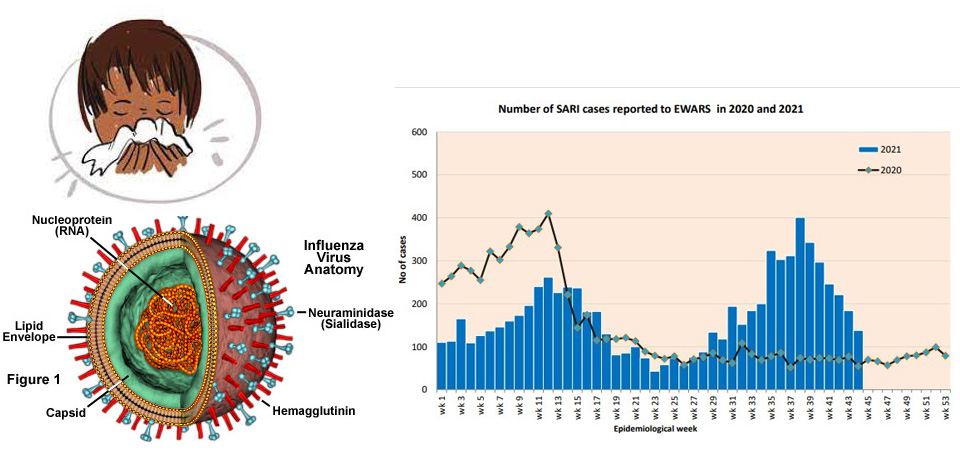Heed prevention, treatment of influenza: Doctors

By A Staff Reporter
Kathmandu, Nov. 17: The weekly bulletins by the Epidemiological and Disease Control Division (EDCD) showed that around 1,600 cases of Severe Acute Respiratory Infection (SARI) have been reported from across the country since October.
The World Health Organisation (WHO) defines SARI case as a hospitalised person with acute respiratory infection followed by a fever of more than or equal to 38 degrees Celsius, cough and with symptoms onset within the last 10 days. The hospitalised person should be admitted for a minimum of 24 hours in hospital.
“SARI is the hospitalised case where an individual has developed complications for influenza due to lack of proper treatment. It is communicable,” said Dr. Sher Bahadur Pun, chief medical officer at Sukraraj Tropical and Infectious Disease Hospital.
According to Dr. Pun, cases of SARI are preventable if diagnosed and treated for influenza early.
Children, elderlies and those with long-term diseases are said to be at higher risks of developing complications for influenza due to their immune systems.
The cases of SARI have declined in the recent weeks but are higher when compared to the previous year. With 138 cases of SARI in 44th epidemiological week of 2021, only 55 were reported in 2020.
Likewise, a total of 352 cases of SARI were reported in 38th epidemiological week of 2021 while only 73 cases were reported during the same week in 2020. It is the highest number of cases reported in a week during 2021.
Health professionals and different organisations cited safety measures abided during the COVID-19 pandemic to have played a major role behind decline in SARI cases but it is yet to be ascertained.
“Researchers believe that the decline in influenza cases during the COVID-19 pandemic might be owing to wearing of face mask, maintaining physical distancing, regular hand washing and lockdowns. However, both respiratory viruses are transmitted the same way, and preventive measures should, therefore, be equally effective to prevent them from spreading,” read a research article titled “Disappearance of Influenza during the COVID-19 Pandemic: Nepal’s Experience” published in Journal of Nepal Health Research Council by Dr. Pun in 2021.
According to doctors, healthy habits like washing hands properly, maintaining sanitation and wearing masks have declined recently due to which there are chances of a rise in SARI cases.
“Symptoms of influenza and COVID-19 are similar but only diagnosis of COVID-19 has been prioritised. Both are serious health hazards and require necessary interventions and preventive strategies from the concerned government bodies,” said Dr. Pun.
Treatment of SARI is difficult when diagnosed late and can also lead to pneumonia. “Visiting health centres (if having symptoms) and consuming medicines prescribed by health personnel after proper diagnosis is beneficial and necessary,” Dr. Pun said.
Health Ministry officials informed that they were aware of the situation and plans to continue awareness campaign regarding health safety measures. They also informed that influenza diagnosis and treatment has been prioritised in health centres.
Recent News

Do not make expressions casting dout on election: EC
14 Apr, 2022
CM Bhatta says may New Year 2079 BS inspire positive thinking
14 Apr, 2022
Three new cases, 44 recoveries in 24 hours
14 Apr, 2022
689 climbers of 84 teams so far acquire permits for climbing various peaks this spring season
14 Apr, 2022
How the rising cost of living crisis is impacting Nepal
14 Apr, 2022
US military confirms an interstellar meteor collided with Earth
14 Apr, 2022
Valneva Covid vaccine approved for use in UK
14 Apr, 2022
Chair Prachanda highlights need of unity among Maoist, Communist forces
14 Apr, 2022
Ranbir Kapoor and Alia Bhatt: Bollywood toasts star couple on wedding
14 Apr, 2022
President Bhandari confers decorations (Photo Feature)
14 Apr, 2022











